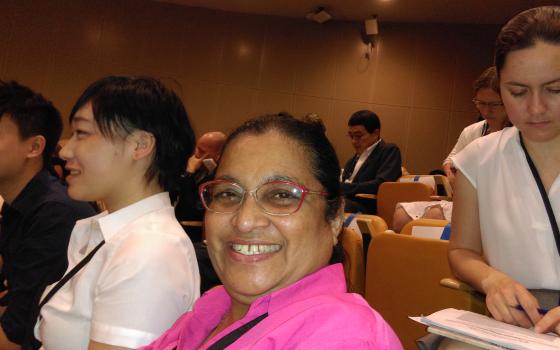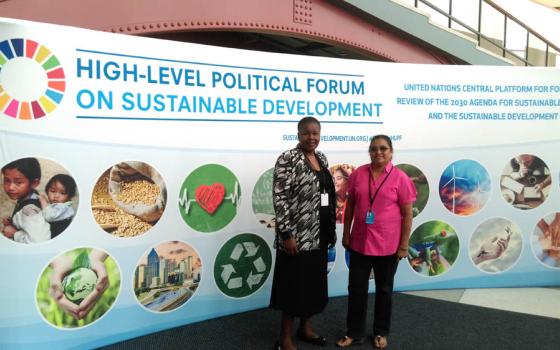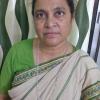An opportunity to attend the High-level Political Forum at the United Nations in New York, in the U.S., from July 9-19 was really an enriching experience. What was this High-level Political Forum about, and what do we religious women have to do with it? As I write this column, I am not sure how many of us are familiar with the workings of our own nations and the commitments of our governments.
After a somewhat successful global implementation of the Millennium Development Goals, in 2015 the heads of 194 countries met at the U.N. and agreed to work towards a more ambitious set of Sustainable Development Goals to be achieved by the year 2030. The plan is known as the 2030 Agenda for Sustainable Development.
The 2017 meeting of the High-level Political Forum on Sustainable Development was convened under the auspices of the U.N. Economic and Social Council, the part of the United Nations that serves as the gateway for civil society’s input — that is, our input.
The theme of the forum this year was "Eradicating poverty and promoting prosperity in a changing world."
This summer’s meeting brought together 44 countries that were to report on the progress they have made in achieving the Sustainable Development Goals. From the total of 17 goals, this time the 44 countries were reporting on their progress in six goals:
- Goal 1. End poverty in all its forms everywhere
- Goal 2. End hunger, achieve food security and improved nutrition and promote sustainable agriculture
- Goal 3. Ensure healthy lives and promote well-being for all at all ages
- Goal 5. Achieve gender equality and empower all women and girls
- Goal 9. Build resilient infrastructure, promote inclusive and sustainable industrialization and foster innovation
- Goal 14. Conserve and sustainably use the oceans, seas and marine resources for sustainable development
It was my privilege to be chosen by my congregation to attend this meeting and to share about our interventions in India and our role in contributing towards realizing the Sustainable Development Goals. What struck me the most was the one phrase that was being spoken constantly, of "leaving no one behind."
Care of the weakest and most vulnerable in our countries, the ones who are voiceless, should be our concern. It calls us to think about: the weakest countries on our globe; how to ensure that there is peace in our world; how to be sure that no one goes to bed hungry. It calls for a global conversation that will lead to global action. Country representatives were speaking the Gospel language! How can we even think of a prosperous nation, when thousands are going to bed hungry, thousands are reeling in poverty, thousands of women and girls are being denied quality education, thousands of people are dying due to lack of the basic amenities of life?
Each country reported on their progress in a Voluntary National Report. Other countries affirmed them or made suggestions, and we in civil society played our role by listening to the reports of our countries and then giving the other side of the story.
Listening to these reports, I was amazed at the commitments of some governments, especially Denmark. Though they are far ahead of other nations in achieving their goals, they humbly acknowledged that there is a long way to go and a lot more to be done. I was distressed by the reports presented by India and Zimbabwe. How long can half-truths be presented; when will real democracy become a reality for the people of these two nations?
I recall Pope Francis' invitation to world leaders when he spoke to them about the role they need to play in working towards a balanced development. Unless people and planet become our priority, there cannot be prosperity. Prosperity will be achieved only when there is participation of people, so that they do not become mere objectives of developmental schemes. They must have a say in what should happen. They must decide whether they are prepared to give up their land and to be evicted from their roots.
How can we call ourselves a civilized society, when we live with huge disparities? Efforts are being made to share the goods of the Earth in an equitable manner. Leaders of nations have to ensure that this will be achieved; budgets have to be reworked so that we can address the burning issues that we face as a global community.
As religious women we need to grow in political consciousness of what is happening around the globe; we need to become the prophetic voice; we must be armed with information; we need to be engaged in the lives of people.
This herculean task cannot be achieved only by governments; it calls for a collective intervention by all peoples who inhabit the universe. It calls us to move out of our comfort zones; to widen our tents and to be generous in sharing. It calls us to lay our table for all to partake, excluding no one, but making room in the inns of our hearts to welcome those who cry out for recognition, food and shelter.
[Dorothy Fernandes is a Sister of the Presentation of the Blessed Virgin Mary from India. She presently serves as Vice Provincial of the Indian province while continuing to be deeply engaged with the urban poor of Patna, Bihar.]


